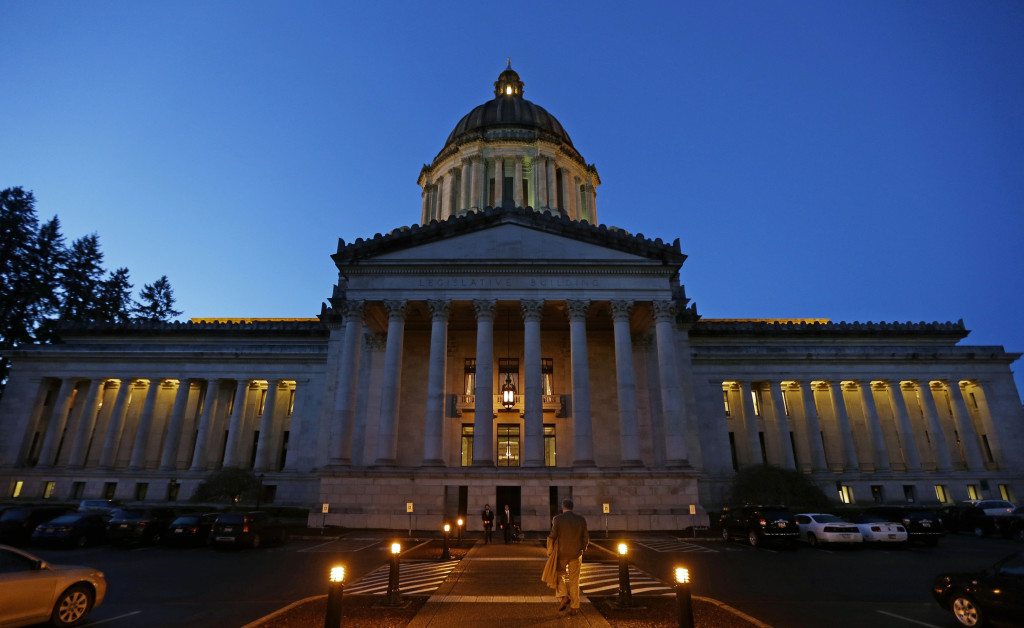OLYMPIA — House Democrats on Monday released a two-year state budget plan that proposes $3 billion in additional revenue — including a tax increase on some businesses and a new capital gains tax — to address a court mandate on education funding.
At a news conference announcing the plan, Democrats lauded the investments in not only education, but in mental health and other social services.
Democratic Rep. June Robinson said that the budget proposal “reflects the values of our caucus and the people of Washington state.”
“We know that we need new revenue to fully fund education and still provide the critical services that Washingtonians expect,” she said.
However, Democrats said while they plan to pass their spending plan on the House floor Friday, they won’t likely take a vote in that chamber on any of the tax bills that pay for it before completing negotiations with Senate Republicans, who passed their own budget plan last week.
Republican Sen. John Braun, the key budget write in the chamber, said that until Democrats can show that they have the votes in their own chamber for the revenue, negotiations will be stymied.
“You can have no real negotiations until they show everything they want to do is more than just a spending list,” he said.
The House proposal was to receive a public hearing on Monday afternoon, and was expected to be voted out of committee Tuesday. A floor vote is expected on Friday. The tax bills will have public hearings next Monday, and be passed out committee the following day, lawmakers said, but would go no further unless they are part of a final negotiated plan.
The Democrats’ $44.6 billion proposal spends $1.9 billion on K-12 education over the next two years. To help pay for it, it seeks a 20 percent increase of the business and occupation tax on the state’s highest grossing businesses, which would raise $1.2 billion over the next two years from about 72,000 businesses. However, small businesses — which have taxable revenue of less than $250,000 a year — would be exempt from the current tax. The plan also gives a $100,000 tax deduction to businesses with taxable revenue of $250,000 to $500,000.
The plan also seeks to levy a 7 percent capital gains tax on earnings from the sale of stocks, bonds and other assets above $25,000 for individuals and $50,000 for those who file jointly. About 48,000 people would be affected by the new tax, lawmakers said. Retirement accounts, most primary residences and most agricultural lands and most timber would be exempt from the tax, as would sale of cattle, horses or breeding livestock.
An increase in the real estate excise tax for higher priced homes would bring in about $420 million. Currently, all property sellers pay a flat 1.28 percent rate. The rate remains the same for homes that sell between $250,000 and $1 million. But the rate increases to 2 percent for home sales between $1 million and $5 million, and it jumps to 2.5 percent for homes that sell above $5 million. For homes that sell for less than $250, 000, the rate is reduced to .75 percent.
The plan also seeks to capture about $341 million through online sales taxes that are currently not being collected by online retailers.
An additional $137 million would come from the repeal of five tax exemptions.
Lawmakers are working to comply with a 2012 state Supreme Court ruling that they must fully fund the state’s basic education system. The state Supreme Court has said that the state has until Sept. 1, 2018 to fully fund education, but that the details of how to do that — as well as how lawmakers will pay for it — must be in place before the Legislature adjourns this year. The current 105-day legislative session is scheduled to end April 23, but many Capitol observers expect lawmakers will need to go into overtime sessions, as they have frequently done in recent years.
The biggest piece remaining of the court order is figuring out how much the state must provide for teacher salaries. School districts currently pay a big chunk of those salaries with local property-tax levies. The Senate proposal that was passed in the early morning hours of Friday puts an additional $1.8 billion toward education, paid for, in part, by a statewide property tax that ultimately would replace local district levies. The plan would raise the local school levy in some places, like Seattle, and decrease it in others, something Democrats have said is unfair. The House plan would lower the local levy rate, but not eliminate them completely.
Unlike the Senate, the House fully funds collective bargaining agreements with state employees, and it does not make cuts to social services programs. The House plan also seeks to freeze undergraduate tuition at the state’s colleges and universities. Additionally, it adds more money to the early childhood and education assistance program.



